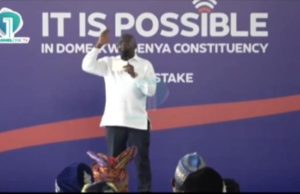By Mabel Esinam Awagah
The Media Foundation for West Africa (MFWA) has developed an action plan aimed at achieving gender parity in media representation and leadership roles in Ghana.
The initiative stems from the recognition of the low representation of women and their limited skills in the media, currently estimated at only 25 percent. The action plan was developed through a series of consultations and media training sessions for selected journalists.
During a visit and the official presentation of the document to Professor Amin Alhassan, Director-General of the Ghana Broadcasting Corporation (GBC), Senior Programme Manager for Media Democracy and Good Governance at MFWA, Rosemond Ebi-Adwo Aryeetey, stated that the action plan outlines a clear roadmap for the next five years to promote gender equity within the media.
Launched in 2023, the project is being implemented in both Ghana and Côte d’Ivoire. In Ghana, four media houses, GBC Kumasi, Morsi Media (Kumasi Love FM), Radio Justice, and A1 Radio, benefited from the initiative. It included training, mentoring, and coaching sessions for media practitioners focused on gender-sensitive reporting and women’s leadership empowerment.
A conference was held as part of the project, culminating in the launch of the strategy document on March 27, 2025. MFWA presented the document to GBC’s management and emphasized the need for practical implementation.
The report highlights the underrepresentation of women in media leadership, revealing that women hold less than 30 percent of leadership positions in Ghanaian media organisations, and even fewer hold senior roles such as Editor-in-Chief or Chief Executive Officer.
It recommends that “media houses should allocate at least 30 percent of leadership positions to women by 2030.” Aryeetey noted that the plan was designed to be “practical and achievable,” avoiding the common pitfall of well-intentioned policies gathering dust on shelves.
In response, Dr. Amin Alhassan, Director-General of GBC, acknowledged the gender imbalance within the media landscape and noted that the corporation is taking proactive steps to address it. One of the key initiatives, he revealed, is the development of a sexual harassment policy.
“It is very true that when you look at the media industry, it’s often the case that at the lower levels, you see a lot of women, and you never know what prevents them from moving up,” Dr. Alhassan said. “When you go into the boardrooms, you hardly see them.”
He continued, “Here at GBC, in the last few years, we have been struck by this oddity, and as a result, we have been working to correct it. One of the documents we have developed recently is a sexual harassment policy. It actually came about after we encountered a very clear example, and when we checked our policies, we realised there was nothing in place to guide our actions.”
“That experience prompted us to put together a sexual harassment policy for the board to approve. It now gives us the opportunity to take action, including reorientation and training for men who may not even realise that their actions are inappropriate.”
The project, themed “The Equal Voices”, is funded by Canal France International and is part of broader efforts to foster inclusion and gender equality in West Africa’s media sector.














